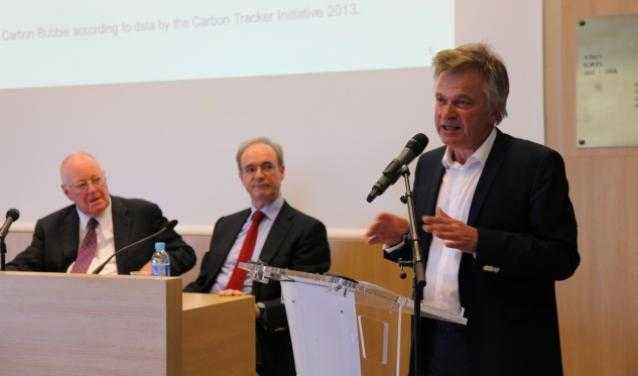Home>“It is time for economists to get into the picture” Patrick Bolton, prof. at Columbia University, on climate change debate

15.06.2015
“It is time for economists to get into the picture” Patrick Bolton, prof. at Columbia University, on climate change debate
Who can finance the transition to sustainable development and how? Patrick Bolton, professor at Columbia University, and Pierre Ducret, the CEO of Caisse des Dépôts Climat tried to answer this question in a conference held at Sciences Po on 4 June 2015.
According to them, the financial world is finally engaging in the climate change debate. So they both set out to show the finance sector’s responsibilities in this critical issue and the solutions that could be put in place to support sustainable development.
Is decarbonisation the solution?
John Coatsworth, provost of Columbia University and moderator of the conference, asserted that economists are the first to be concerned by the next international climate conference scheduled for December 2015 in Paris (COP 21), as it is they who can influence the final decisions and push for action.
According to Patrick Bolton, investors can divest, engage or decarbonise, and decarbonisation is the only effective means of acting in a socially responsible manner while managing risk. The decarbonisation approach consists in encouraging investment in companies with low carbon footprints, thereby devaluing the more carbon-intensive companies. Patrick Bolton proposes creating a benchmark index based on companies’ carbon footprint and excluding the worst 10 or 20 percent of carbon performers. Those who continue to invest in these heavy polluters run the risk of ending up with stranded assets. As Pierre Ducret stressed, sustainable development is not only an ethical issue, it is also a major financial concern which must be taken seriously by investors if they want to protect their capital and invest in a responsible way.
Both private and public finance have a role to play
As public funds are limited, Pierre Ducret believes that sustainable development should be financed mainly by private investors, such as insurance companies. He considers that the shift towards a sustainable society depends on risk assessment and limitation, placing insurance companies on the front line. However, public finances have a regulatory role to play, which can include promoting green bonds, encouraging carbon pricing, facilitating capital mobilisation by creating green banks and promoting the traceability of assets.
Yet, this shift to a more sustainable society requires the finance sector to adjust its expectations. Currently, finance is focused on immediate consequences. With climate change, investors will have to learn patience.
Related links
- This conference was part of Make It Work, an initiative launched by Sciences Po to prepare the next international climate conference in Paris scheduled for December 2015 (COP 21).
- Article Hedging climate risk, Mats Andersson, Patrick Bolton and Frédéric Samama, 2014
- Dual Masters degree programmes Sciences Po-Columbia.
- Dual Bachelor's degree programme Sciences Po-Columbia